We are taking part in a surgical mission trip that has been orchestrated through the Community Empowerment initiative to provide surgical care and long term postoperative follow up for complex orthopaedic surgery patients from impoverished areas in the Dominican Republic. Our volunteer group partners with local surgeons, anesthesiologists and medical students to cross-train local providers. All our services, equipment, hardware and medicine are free to patients. We will be flying down to Santo Domingo 10/4-10/11, departing on a Saturday morning, arriving Saturday evening, and traveling to the town of Azua. There, we will spend the evening and following Sunday involved in a preoperative planning conference with the surgical and hospital team. As a surgical resident, I will be participating in surgical care and postoperative care along with our lead surgeons, Dr Garras and Dr Negam, who are trained in orthopaedic trauma surgery and reconstructive surgery of the lower limb. Our group has also planned to partner with local leadership to educate the local providers on the nonoperative, pre- and post-surgical treatment of these types of patients to help create a self-sustaining system in which our assistance is no longer needed. The patients we operate on will have follow-up care established to ensure our efforts lead to positive outcomes, and those patients will go on to refer their community members to the healthcare facilities that we have partnered. Our goal is to provide essential healthcare to individuals we have identified within the community prior to this trip, and to create centers of excellence in this field of medicine, creating both immediate and long-term impacts within the region.
As an individual born with bilateral congenital foot deformities, I have always been sympathetic to the struggles of everyday functionality of individuals with chronic pain or disability. The main populations we are targeting within the Dominican Republic are those with musculoskeletal injuries or limb deformities that require advanced Orthopaedic surgical care, which I was fortunate enough to have as a child and wish to pay that privilege forward. These patients suffer from conditions which may have been present from birth or developed as a result of trauma, long-term degeneration, or chronic infections which are common in laboring patients with poor access to elective surgical healthcare or are a result of prior injuries, surgeries, or wounds that are a complication of other medical comorbidities. Over 50% of the patients in the community of Azua live far below the poverty line, among the highest in the nation. Usually, there are many gaps and barriers to getting surgery in the Dominican Republic. The remote location of many patients near Azua and the limited availability within the local hospitals prevents many patients from seeking treatment. The tertiary medical care in Santo Domingo takes many hours of travel to reach, and is often unaffordable for the patients we will be serving. Further, their poor health literacy precludes them from seeking preventative care that may reduce disease burden early on. Their healthcare system is under-resourced, and patients must wait months or years to schedule surgery, during which disease states may progress and become more difficult to treat. Patients are charged out-of-pocket for equipment and hardware at the public hospital and often it costs more than their family makes in a year. We will be bringing supplies with us, including general surgical supplies and specialized orthopedic implants to provide life-changing care at minimal cost to the local population.
I am fortunate enough to be joining this trip as an orthopaedic surgeon in training, where I may learn preoperative assessment skills and surgical techniques from 2 well-trained trauma and reconstructive surgeons. Importantly, we will be operating in a low-resource environment, which demands creativity and efficiency within the operating room to solve problems without having access to the latest technology or unlimited supplies and instruments. This will teach me within my own surgical practice how to reduce my waste, improve my operative efficiency, and begin to think outside-the-box about my nonoperative and operative treatment approaches. Each patient on this trip requires a very personalized treatment plan. I will pay close attention to how my faculty members consider age, medical comorbidities, and orthopaedic diagnoses along with the patients’ own needs including occupation, living situation, religious or other personal beliefs, etc, when developing a treatment plan.
Furthermore, surgery can be an intimidating concept for many patients. I have been speaking medical Spanish to my patients for many years now, but this will be the most immersive experience possible for me to learn how to connect with my patients and counsel them on the risks, benefits and expectations of getting surgery. This is often a complicated discussion to have, especially while speaking Spanish with people who have different dialects to those I am usually exposed to. Although this is my first global health trip, I do not intend for this to be my last surgical mission trip. Thus, these communication skills will be directly applied in a similar setting in other communities as I continue participating in Global Health trips, as well as in my everyday practice within the United States, or in whichever country I choose to practice in.
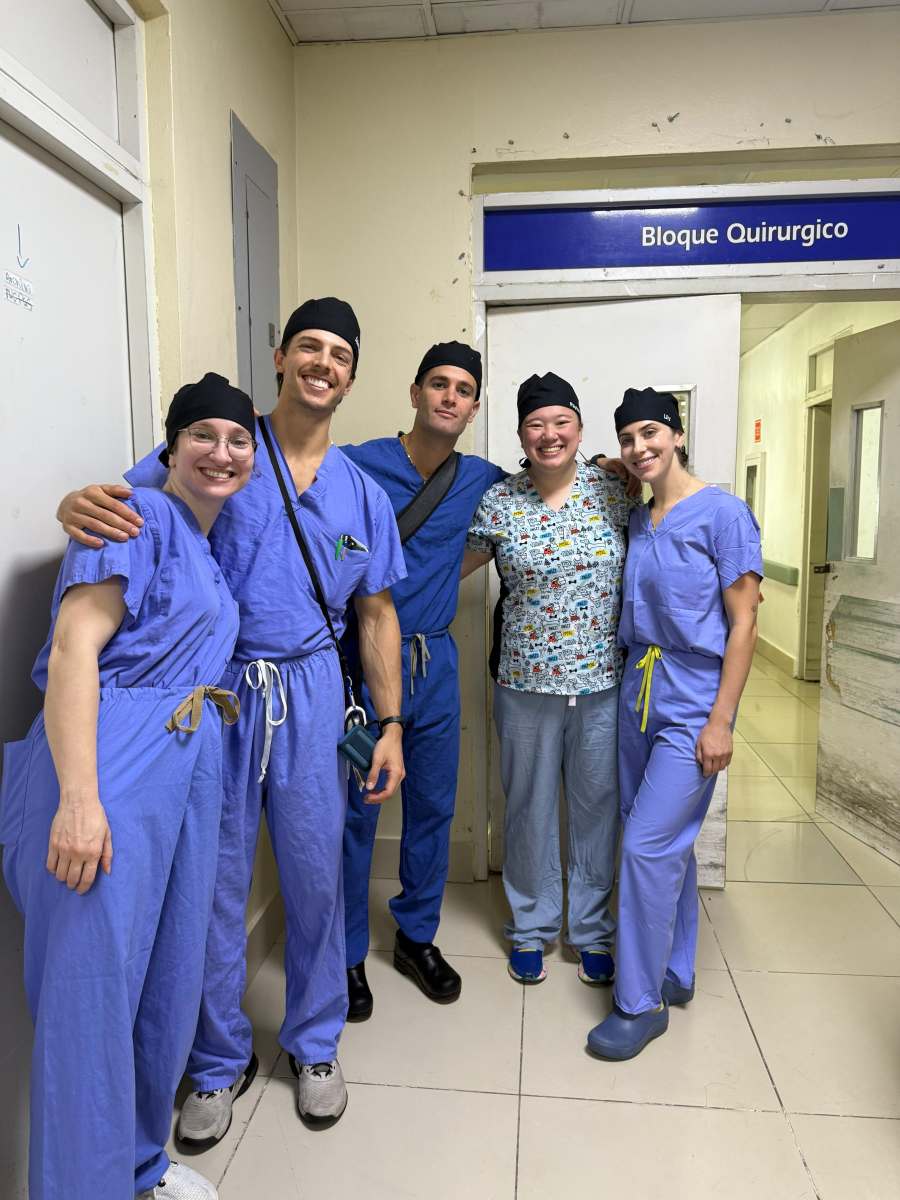
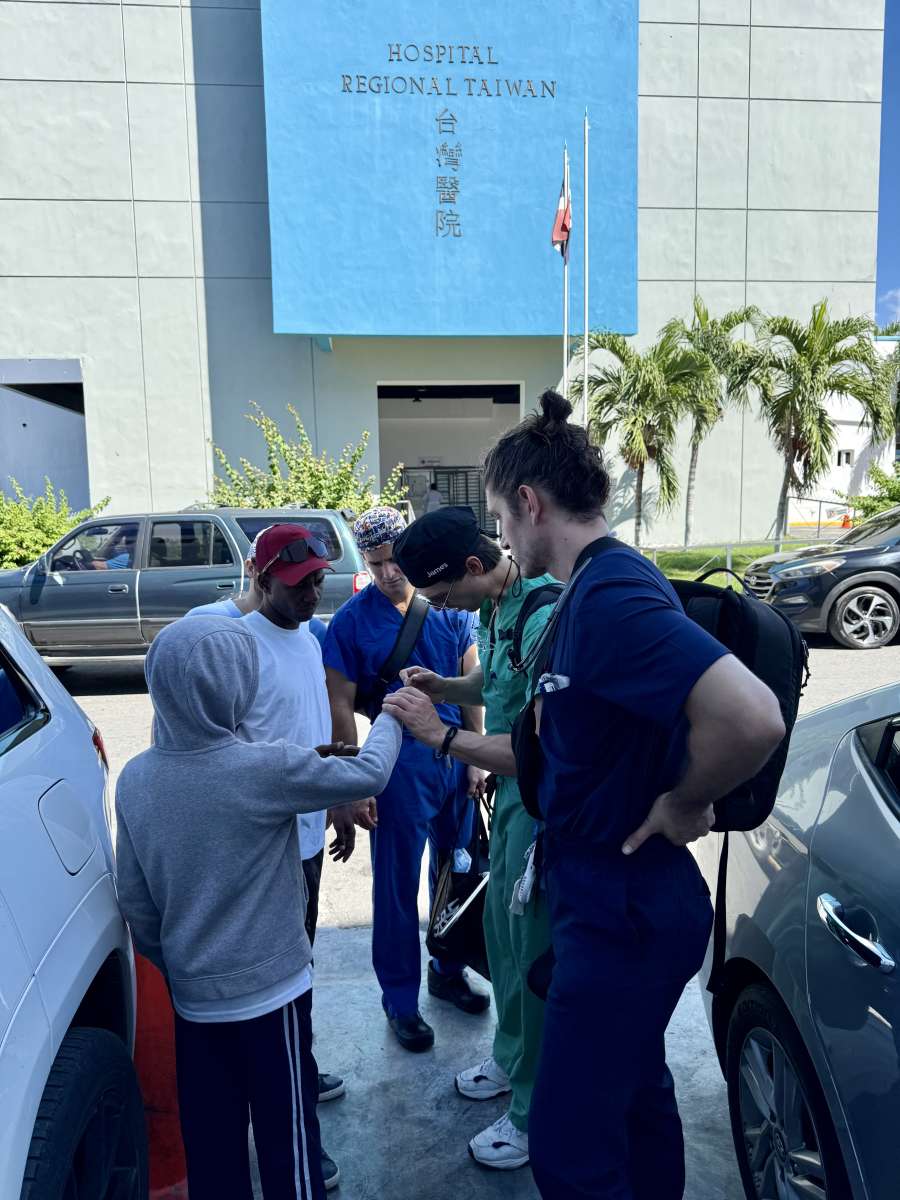

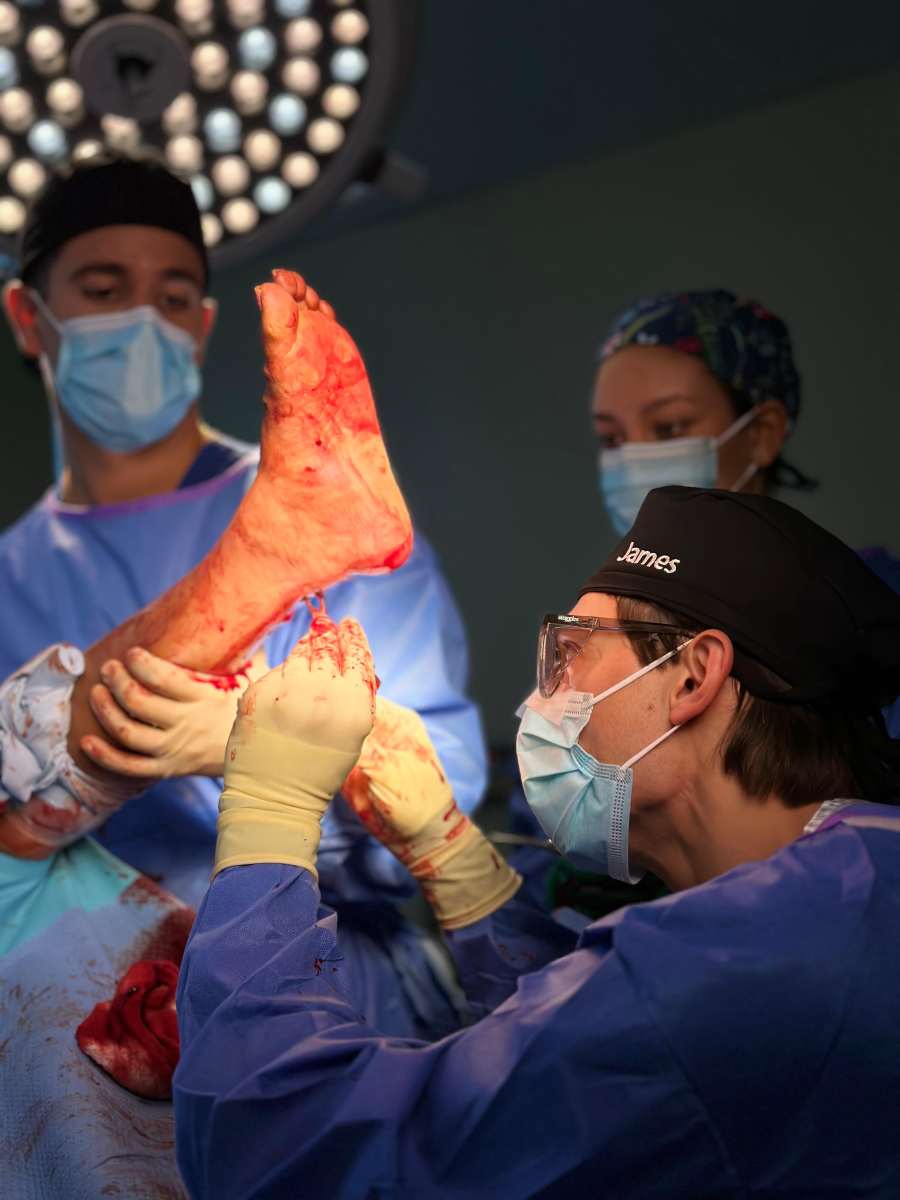



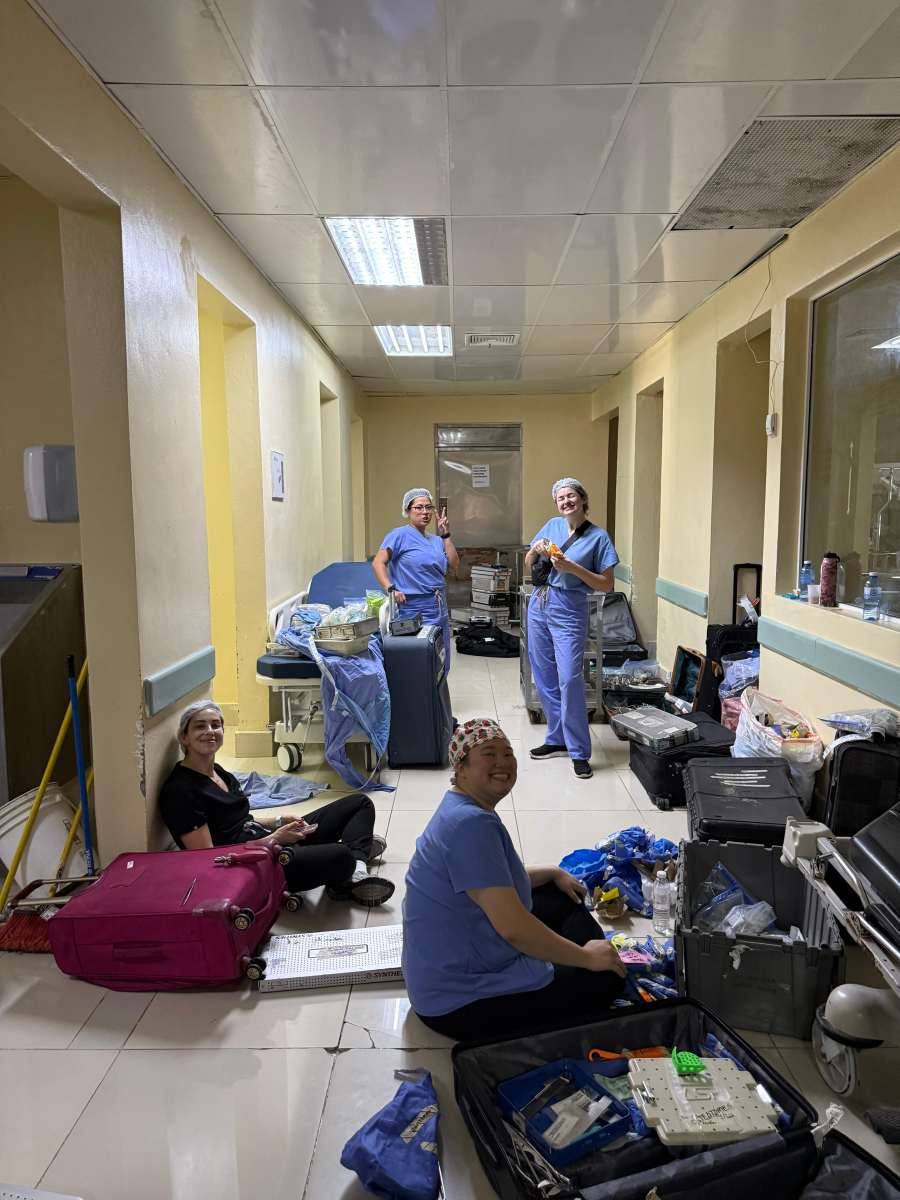






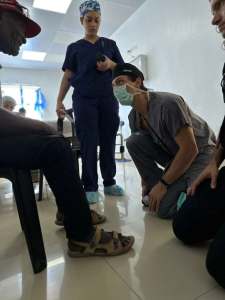



We had the honor, privilege, and training experience of a lifetime to spend six days down in Azua, a small village about 2 1/2 hours away from Santo Domingo in the Dominican Republic, on an Orthopaedic Surgery outreach trip. I travelled thanks to the assistance provided by the Doximity foundation grant to meet a group called Community Empowerment, a local organization within Santa Domingo and neighboring communities such as Azua that is comprised of logistic coordinators, local physicians, medical translators, and other medical and non-medical staff that coordinates these medical and surgical trips with Rush University and other academic institutions. The first day, we arrived in Santo Domingo and stayed at a group home where we welcomed local patients from Santo Domingo into our living room to evaluate their injuries. From the beginning of the week, it was very clear that we were going to see many patients with chronic disabilities and untreated injuries resulting from high speed motorcycle accidents. These injuries, such as nerve palsies, joint dislocations, and extremity fractures, are very common due to the popularity of motorcycle transportation within the Dominican Republic. Fortunately, none of those patients that morning needed surgical intervention, so we packed up our bags, including the trailer full of expensive orthopedic implants, and made the trip over to the village of Azua. We arrived that evening and were welcomed by a line of over 25 patients who had traveled from rural villages in to see us. Many of them had prior surgeries with painful implants, or simple primary conditions such as knee arthritis or shoulder injuries that had never been seen by an orthopedic specialist before. We offered them treatments ranging from braces, to injections to therapy or medication prescriptions, and began preoperative evaluations to optimize patients who needed surgery. One of the most remarkable parts of the trip was seeing how grateful these patients were for being given the gift of a proper evaluation and, even just a simple diagnosis. This is a direct contrast to many of the patients in the United States, who come in with particular demands and expectations of what surgical providers can do for them; instead, the patients of Azua were just hoping to do whatever it took to be able to provide for their family on a day-to-day basis and avoid going completely hungry, which would happen if they're unable to work. For the rest of the week, patients would hear by word of mouth that we were in town and steadily presented to the hospital to be evaluated by us during our breaks from the Operating Room in hopes that we could provide them some sort of relief for their pain or disability. We evaluated patients in hallways, waiting rooms, and outside on the streets. It didn't matter if they had any formal X-rays or appointments. If they needed our help, we lent them our eyes and ears. As a resident completing my orthopedic surgical training, it was reinvigorating To be able to provide on the spot medical care for people regardless of insurance status or ability to pay. This brought back fond memories of the Hispanic free clinic that I got my start in as an undergraduate student in college where I developed a passion for taking care of uninsured Spanish speaking patients.
On Monday, we opened up the operating rooms using the tools that we had brought and sterilized with the help of the local hospital staff at the Hospital Regional de Taiwan and the nearby new trauma center in the village of Azua. We did not have most of the luxuries that I'm used to operating with in America, like multiple functioning operating rooms with anesthesia providers and monitoring machines, readily available sterilized tools and implants, saline irrigation bag to wash out surgical wounds, dressing supplies, and more. Everything was limited, forcing us to develop creative ways to treat our patients. I saw conditions that I had never seen before and don't expect to see again in my surgical training: numerous patients with previous missed diagnoses that resulted in limb deformities of 45° or more that severely limited their function; multiple patients with plates and screws sticking out of the skin signaling chronically infected limbs that required implant removal and complex soft tissue closure procedures; untreated ankle fractures, forearm fractures; and even a bedridden young child with a broken hip that nobody had diagnosed for over 2 weeks. We operated until 9:00 or 10:00 PM four straight nights in rooms that did not have air conditioning, often requiring 4 to 5 hours to remove broken or faulty implants. Under normal circumstances, we could consider amputation of the limbs for some of these patients. However, these patients do not have access to complicated prosthetics and wound care which makes amputation a very disabling procedure and would completely change these patients' availability to provide for their families. This is another stark contrast to the United states, where our access to medical care and medical technologies makes amputation a feasible treatment for these chronic or otherwise untreatable infections. But during this week, there was no such thing as untreatable.
Despite the morbidity of some of the diagnoses we made as well as the difficulty and extent of the surgical procedures, when we would round on patients the next day after surgery, they would always greet us with a big hug and a smile on their face. They never had any complaints about pain post-operatively, and were simply grateful for us giving them another chance to live their life. While this was a very physically demanding week in the operating room and in the clinic, speaking with these patients after surgery and hearing their motivations to recover made it worth every second. Every member of our team worked tirelessly to provide whatever care we could for these patients, and the people at the Community Empowerment organization worked sun up to sundown to acquire any additional goods or services that we needed to help these patients. We were even able to establish post operative follow up care with local physicians and create rehabilitation protocols for our patients that would ensure they not only recovered from their surgery, but regained their independence, and thus their dignity. Unfortunately, there were many patients who were not medically cleared to undergo surgery while we were in town, despite our best efforts. Knowing that those patients had to head back to their villages without being able to obtain the surgeries they needed to live their lives is the hardest reality of this trip. This fact, however, is what guarantees that I will be returning on this trip within the next year with the Community Empowerment group to finish what we started, until every member of that community is able to get the Orthopaedic surgical care they need. Thanks again to the Doximity Foundation for the financial support and to my residency faculty for allowing me the opportunity to embark on the experience of a lifetime.